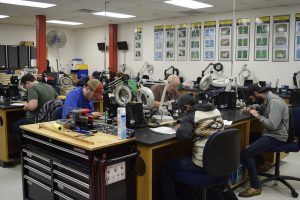(WACO) – The United States healthcare system has been targeted this year as having a high vulnerability for cyberattacks because of advanced network connectivity for equipment and data, according to a nationwide healthcare technology organization.
Texas State Technical College’s Biomedical Equipment Technology programs in Harlingen, Marshall and Waco train students to fight off hackers trying to get into critical medical systems.
“We teach them the basics of how to learn what the hackers know,” said Garrett Seeley, associate professor in the Biomedical Equipment Technology program at TSTC in Waco. “We show students how hackers communicate with each other and let people know what they know.”
The Association for the Advancement of Medical Instrumentation is a nonprofit organization that released this month its AAMI Pulse: Cybersecurity survey, which included responses from 118 nationwide information technology and healthcare technology management workers. The survey found that about 75 percent of participants thought their medical facilities could react quickly to a cyberattack, while 9 percent of people thought cyber security was considered a low priority in their workplaces.
“The best way to predict is to communicate,” Seeley said. “Hospitals are trying to shoulder the burden.”
Malware is considered one of the main tools to infiltrate hospital security systems, according to the association and the Institute for Critical Infrastructure Technology. Malware can find its way into network-connected and configured medical devices, smartphones, tablets, implanted patient devices and records systems.
Seeley said it is not specific equipment that people try to disrupt – it is the technology system that ties everything together. He said the goal for hackers is to bring networks down and cause disruptions.
“People are remarkable in that they can find loopholes that you don’t know exist,” he said.
The Food and Drug Administration has also found in recent years that the unauthorized sharing of passwords enables people to undertake cyberattacks.
The need for medical equipment repairers to keep technological systems secure in Texas is expected to grow through 2024 from at least 2,600 workers to a projected 3,300 employees, according to projectionscentral.com, a clearinghouse of short-term and long-term state labor market predictions.
Baylor Scott & White Health in Dallas has hired several of TSTC’s Biomedical Equipment Technology graduates.
“The TSTC program is probably the strongest, in my opinion, in the state of Texas,” said Carol L. Wyatt, director of Healthcare Technology Management for BSW’s Northern Region in McKinney. “The graduates we have hired at BSW, in my experience, are ready to hit the floor running. That is exactly what we need – a good foundation. When they come in, we ‘Baylorize’ them and teach them how to use our database and how to be good BSW employees.”
Cyber security plays a critical role in medical equipment security at the sprawling healthcare system spread throughout North and Central Texas. Staff members also consider who emails are being sent and forwarded to as part of security.
“They (biomedical equipment technology workers) have to make sure all patient information is secure and the equipment is secure, whether with a password, a firewall or physical cables,” Wyatt said. “It’s part of our responsibility in the management of maintenance of medical equipment that it is taken care of.”
There are eight two-year programs for Biomedical Equipment Technology in Texas, according to the AAMI. TSTC offers the Associate of Applied Science degree in Biomedical Equipment Technology in Harlingen, Marshall and Waco. The Waco campus also has the Associate of Applied Science degree in Medical Imaging Systems Technology.
“A two-year technical degree in Biomedical Equipment Technology with added Information Technology certifications may provide graduates with an earning potential equal to or greater than that of many four-year degrees at much less cost and time spent in the classroom,” said Nicholas Cram, associate professor and lead instructor in the Biomedical Equipment Technology and Process Operations Technology programs at TSTC in Marshall. “The workforce landscape has radically changed in healthcare technology over the last 10 years and will continue to change in the future.”
One of the courses that TSTC’s Biomedical Equipment Technology majors take is Medical Equipment Networks.
“As a biomedical equipment technician, you are responsible for maintaining, calibrating and troubleshooting problems related to all of the medical devices in the hospital,” said Cram. “With expanded and immersive capabilities of healthcare networks, it is common to have medical devices providing physicians with ‘real-time’ physiological data. Biomeds need to understand this aspect of the data flow if problems occur. It is an extension of the medical device troubleshooting process.”
